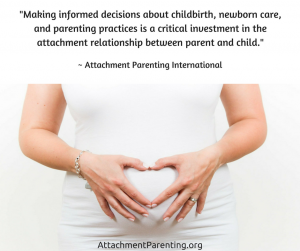Tag: informed choice
Screentime and Attachment Parenting
 There are issues that Attachment Parenting International (API) does not take a stance on — circumcision, vaccinations, cloth diapering and elimination communication, to name a few — and instead advocates for all parents to be informed when making parenting decisions that work best for their families. The same applies to choices about media access for children.
There are issues that Attachment Parenting International (API) does not take a stance on — circumcision, vaccinations, cloth diapering and elimination communication, to name a few — and instead advocates for all parents to be informed when making parenting decisions that work best for their families. The same applies to choices about media access for children.
To me, Attachment Parenting (AP) doesn’t mean we’ll achieve perfection or that all AP parents will come to the same conclusions. It means we’ve made a commitment to inform ourselves and make conscious choices. We can all respectfully “agree to disagree” when parents have informed themselves and understand the pros and cons. Biases and prejudices should have very little — nothing! — to do with it. Have we considered the research? Have we carefully observed the dynamics in our own families? Can we tell whether media is connecting or disconnecting parents and children in our homes?
 For my family, I want media to be an event, not a lifestyle. I want my kids to be able to happily go for weeks without using it! So occasionally, if I see symptoms of dependency, we go on “detox” and course-correct — basically by getting busy with other things. I want us — adults and children — to use media, not have it use us. And I certainly don’t want media — with all it’s commercial motivations — to cheat my kids out of time to be creative, to be helpful, to be thoughtful, to just be.
For my family, I want media to be an event, not a lifestyle. I want my kids to be able to happily go for weeks without using it! So occasionally, if I see symptoms of dependency, we go on “detox” and course-correct — basically by getting busy with other things. I want us — adults and children — to use media, not have it use us. And I certainly don’t want media — with all it’s commercial motivations — to cheat my kids out of time to be creative, to be helpful, to be thoughtful, to just be.
For us, that means once or twice a week, we consume a little media, mostly together. The other six days, it’s just not an option. That’s how we thrive best.
For some of my AP friends, that’s way more than the none they believe is best. Compared to other AP families, our media use is a fraction of what happens in their homes.
Information and discernment can lead us to our own version of balance. This can change depending on the age and stage of our children, which is completely aligned with API’s focus on the importance of understanding child development needs.
I think it’s important for parents to take a good, close look at the research and have an open, honest conversation with others. Instead of judging or lobbying for one “side” or another on media use, the focus can be on informing ourselves together. Just being willing to ask the question, knowing that answers may be variable, would be a great service to our AP communities.

